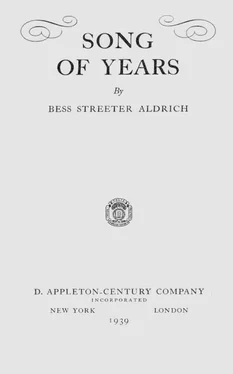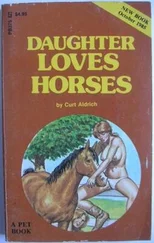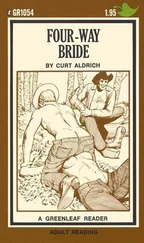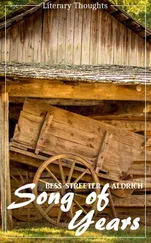“My name is Wayne Lockwood.”
“Glad to make your acquaintance, Mr. Lockwood, and welcome you to the Red Cedar Valley.”
They shook hands, and when Wayne unconsciously glanced at the young girl, high on her tall horse, Jeremiah Martin said: “That’s one of my girls. Let’s see now, slips my mind at this time just which one she is.” His little blue eyes were twinkling behind their black bushes, the only apparent evidence that he spoke facetiously. “Turn around here ’n’ let’s see if I can make out.” And when the young girl smiled complacently down at the two as though this sort of joking were an old and common custom, he spoke in the manner of one who suddenly remembered. “Oh, yes, now I recollect . . . this one’s Suzanne.”
Wayne Lockwood, raised in the atmosphere of his parents’ genteel New England home, took off his cap and held it at his breast while he stepped to her mount’s side and shook the girl’s hard little hand.
“I’m pleased to make your acquaintance, Suzanne.”
“Howdydo.” She was neither forward nor shy, merely matter-of-fact, as though strangers were an everyday occurrence.
There was conversation between the two men about the land, the number of sections taken, prospects of other land-seekers coming in and, surprisingly to Wayne, the offer from Mr. Martin in behalf of himself and the other settlers, to help build the cabin. When Wayne protested that he had expected to do everything himself, wouldn’t want to take them from their own work, Jeremiah Martin broke in with: “We’ll all be ready to help cut to-morrow morning’.”
He mounted his mare, turned her preparatory to riding back toward his home, and then said as casually as though he had spoken of it before: “We’ll look for you to supper to-night.”
“Oh, but . . . I’ve got supplies.”
“Just as important to break bread together out here as to break sod.”
“I just meant . . . it wasn’t necessary.”
“Friendship is one of the most necessary things in this world anywhere, my lad, but you’ll need it out here more than you ever have back home.”
“Well, I thank you . . . of course . . .”
They were starting away. The girl looked back over her shoulder and spoke for the first time since her brief salutation.
“We eat about sundown,” she called back. And as casual as it was, Wayne rather liked the fact that she had added her voice to the invitation. It gave a feminine slant to it, as though she represented the women of the household who had the cooking to do.
The two were gone now—Jeremiah Martin, tall and dark-skinned, black of beard and eyebrows, looking as sturdy as any hickory tree, and little Suzanne Martin, her gray print dress blowing into a huge puffball as her horse galloped across the prairie.
All afternoon the sounds of Wayne’s ax rang out where ax had never been before. When the sun was near the horizon he brought water from the creek and washed. Uncertain whether or not to get out his best suit with stock and vest, he finally decided against it, merely brushing his breeches and putting on a clean dark shirt.
Then he combed his thick light hair in front of the little diamond-shaped mirror set in the cover of his hidebound chest. He mounted Blackbird and, leading Belle, set out across the prairie toward the smoke column there at the edge of the grove. Indians were camping by the river and while he had been told in Prairie Rapids that no one feared them greatly, a horse grazing by itself would be a temptation to any chance redskin passer-by.
All the way over toward the cabin he was wondering about the approach of these strangers. He had no great liking to meet new people under any condition, and if, by any chance, Jeremiah Martin himself or the young girl were not around, he had an idea he would be feeling rather foolish to present himself to any of the others with a “here-I-am, feed-me” air.
Mr. Martin had spoken of other girls. That meant at least two others. Girls! He hoped he wouldn’t have to see very much of them. This was a man’s world out here.
The sun had started slipping over the rim of the world now. As he rode, the scene spread out before his eyes challenged him again, as so often it had done in these days he had known the Iowa prairies. He turned in his saddle to get the picture in all its phases. To the west and north, wind rippled the tall grass so that it dipped in long swirling waves of dark-green foam on a light green sea. To the northeast only the thin fringe of timber that clung to the creek bed broke the green sea line. To the south of the trail over which all settlers came stood a large patch of timber land, open prairie beyond, and in the far distance the thick woods along the Cedar. A fine enough sight for any one’s eyes.
And now at the edge of the patch of timberland was a log structure he was to find out later was the school-house, and just beyond it the log cabin of the Martins sat behind the only stake-and-rider fence he had seen in the country. Surprisingly, it was a large log house, much larger than the little tavern at Independence, and equally surprising was the fact that it was whitewashed. To be sure the whitewashing could not cover all that irregularity of logs—stretches of black alternated frequently with the fresh white—but the effect gave him a momentary thought of the good farm-houses back home.
On closer view, its appearance was strangely like two log houses which some giant had pushed together, the end of one flush against the side of the other to form a letter T, and both parts showing small glass windows on the lower floor, solid wooden openings in their lofts.
Because of its two parts it seemed to sit among the native trees like a big speckled brown and white bird in its green nest with one wing outspread, for branches of the oaks and maples, cottonwoods and walnuts nearly touched its roof at the back and sides. The prairie fell away from it at the north so that the front yard would have had only the horizon for its boundaries if the fence had not put limitations upon it, giving the whole place more of a settled appearance than that of any of the other cabins which dotted the trail. A wide opening in the fence denoted the wagon drive, but in direct line with the door of the cabin a small split-rail gate, hung on leather hinges, was evidently a concession to old eastern ways.
And now Wayne was turning into the wide opening in the stake-and-rider fence.
Yes, his fears were to be realized, for although the cabin door stood open there was not a soul in sight. Only from the rear of the house came a high clear voice singing that it had been washed in the blood of the Lamb.
He would have to go through that embarrassing moment then of knocking and saying his little speech of “Here I am, ready to be fed.” He was wishing heartily that he was back at the wagon by the side of his own camp-fire, when two shaggy dogs bounded forth from somewhere, noisy with prospects of attack, but deciding he was not an enemy, went into a mild form of hysterical welcome as he dismounted and tied the horses to the rail fence.
At the noise of the dogs, immediately there were two comely young women appearing in the front doorway. Another with a pan in her hand peered around the corner of the house. From the loft at the left the solid wooden shutter opened outward and two feminine heads appeared. Wayne was vaguely conscious that there were others behind them. It gave him a feeling of embarrassment and indecision, brought a sudden memory of arriving home one afternoon back in New England when his mother was holding a meeting of the ladies of the church. This could hardly be anything of that sort, could it?
Of one thing he was certain—there was no necessity to make himself known in any way, what with girls looking out of windows and tumbling out of doors, and the dogs yelping their excited welcome. Girls! Gosh all hemlock—he didn’t even like girls.
Читать дальше












